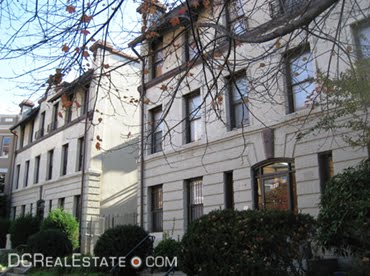 J Street Development and equity-partner Westbrook Real Estate Partners will hold the official ground breaking ceremony for their office condominium building tomorrow at 111 K Street NE, where pedestrians like us can watch big-wigs drop their golden shovels into the dirt. Each of the nine floors will be its own 9,000-s.f. condo (presumably sans granite countertops). Among the A-list invitees for the ceremony is Delegate Eleanor Holmes Norton and her former intern, Mayor Fenty; the latter has yet to reserve a seat for the event, although the J Street staff undoubtedly hopes he'll show, fedora and all.
J Street Development and equity-partner Westbrook Real Estate Partners will hold the official ground breaking ceremony for their office condominium building tomorrow at 111 K Street NE, where pedestrians like us can watch big-wigs drop their golden shovels into the dirt. Each of the nine floors will be its own 9,000-s.f. condo (presumably sans granite countertops). Among the A-list invitees for the ceremony is Delegate Eleanor Holmes Norton and her former intern, Mayor Fenty; the latter has yet to reserve a seat for the event, although the J Street staff undoubtedly hopes he'll show, fedora and all.The 90,000 s.f. addition of commercial space, only a block away from the bustle of Union Station, will be presented as an 11-story building with a self-described "grand two-story lobby," thanks to the design strategy of Gensler Architecture Worldwide. J Street has incorporated all of the necessities to facilitate commerce, a 3,000 s.f. conference center on the second floor, underground parking, 1,000 s.f. of retail, a rooftop terrace and most importantly, a prime commuter location. 111 K will serve as the first of a pair of offices J Street has planned for the 1st and K intersection. The second, just across the street at 100 K, will offer double the amount of office space and 7,000 s.f. of retail on a lot ten-times as large; a tentative construction timeline puts groundbreaking late in 2008.
111 K is not striving for LEED status, although green features have been incorporated into the overall design. As with most DC's newest buildings, it will house a green roof atop its tinted glass, use recycled construction materials and utilize an assortment of energy star equipment.
“We feel that 111 K Street is a terrific opportunity for office condominium owners," said Jay Bothwell Principal and Senior Vice President of Design and Construction at J Street. The design, Bothwell added, allows owners to "control their facilities costs in a uniquely designed Class A office building in an exciting and well situated area of the District." With regards to avoiding the typical leasing procedure, Bothwell added, "We're very pleased with the way the market has responded to this relatively underutilized product." 111 K Street is set for completion in mid-2009.


























